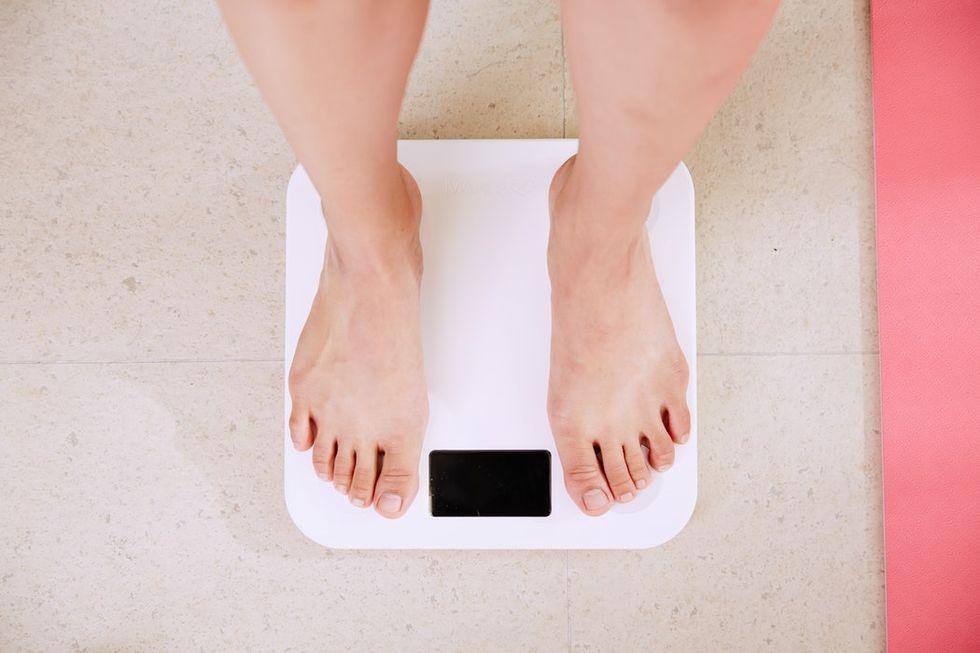What was life like before weight didn't matter? Really, truly, think about it. Think about what it must have been like, how freeing, how absolutely beautiful it would have been to not know your gravitational pull to the earth or, for that matter, the reasons why people think it's so important. Imagine eating when you're hungry when you want to, viewing that internal voice as the most powerful one in your life. Come on, really imagine it.
Whether people admit it or not, weight bias and diet culture have affected them in one way, if not many. It is in the portions of cake served to men vs. women on your favorite T.V show and in the types of bodies modeling your favorite brand. It is clearly shown in advertisements for certain fad food trends and in the daily speech of the "healthiest" person you know.
It is shown through class and social norms - stereotypical sizes corresponding to a level of wealth. Things like "I need to work this off" and "I'll just eat less tomorrow" and "I should be able to fit into these pants if I stop eating sugar" are overlooked as our culture's common perceptions of food and eating. Instead of being celebrated, viewed as a wonderful necessity, accepted as a neutral part of being alive, food has become the enemy and our bodies seem to follow suit.
When an alcoholic is introduced to treatment from a well-researched addiction, avoiding the substance yourself, the people who may overuse it, and places that it is served are some of the most basic rules. On the contrary, when introducing recovery to a disordered person, food cannot be simply avoided at all costs. Food is everywhere and you don't get to rid yourself of one of life's most common necessities. And while alcoholism to some may be considered very different from Anorexia, and eating disorders in general, I will argue that it is an addiction like any other - weighing yourself being one of the greatest components.
Faced with the task of making food and eating normalcy in a society that seems to demonize it, is like telling an alcoholic to stop drinking, but go to a party every day where people are drunk in every corner. You can not undo decades of a $60 billion industry. The people that say it's in your control to have the body of your dreams, that working out is a sign of self-discipline, and that if you have your physical appearance "together" you must have it all "together." These messages are diet culture at it's finest, doing everything to get you to "buy your body." All achievable by your step on a scale. It's hard to feel as though weight does not matter where everyone around you is convinced otherwise.
While the first spring scale was invented in 1770, it was used for weighing jewels to understand their density to attach corresponding prices - created to understand the worth of something. The first mass scale was invented for THINGS, not for people, and while we still tend to use this device to understand worth, we somehow forgot that the intention never included a heartbeat at all and instead of keeping it in inside of grocery stores and diamond retailers, it has become more common in bathrooms and gyms. Before the 18th century, we lived for hundreds of years without needing that little number.
I emphasize little because that's exactly what it is. How much an individual weighs is minuscule in comparison to the things that really matter - the way they treat their parents and how they listen to their friends, the babies they carry for nine months and the partner they are, the drive they have for work and passion for art, cooking or athletics. Weight doesn't care about sickness or muscle or height or memories, it forgets about trauma and guilt and neglect. Weight is one thing and it ignores thousands.
After 2 years of weighing myself every day, I had gotten to a point where the scale was what I lived for. My decisions, my eating habits, my exercise routines, and my extracurricular activities went into managing that little number. And, even when it said what I wanted, I only wanted more. No matter the number, restriction was the answer. Nothing was ever quite enough.
Only now can I see that I had to get out of it to truly understand the harshness of my behaviors and that I was blind to the control it had captured.
In hindsight, being aware of what you weigh never benefits anyone or changes anything - at least not for the better. It will not change what has already been done or make you a better person or encourage you to be a more authentic you, but it will change your attitude and it will affect your self-esteem, it may even change your relationships and your priorities. And if you continue on, like me, it may hurt your health and damage the way you decide to live. The scale is not good - it is no good. It is very bad, it is terrible.

















